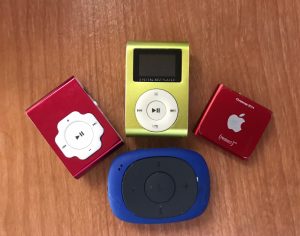Watching the snowfall in the freezing cold in New Jersey, one thinks fondly of the past summer, the time for audiobooks. Our corona reads book recommendations also included this format, even though Rutgers Libraries do not provide access to audiobooks. Looking back, we were on track.
 According to the Audio Publishers Association, audiobook listening was already on the rise in 2019, when 50% of Americans listened to an audiobook as shown by the data from The Infinite Dial 2019 survey. Everyday technologies support the format, such as smart speakers and in-dash entertainment systems in cars, with the latter surpassing the home as the #1 audiobook listening location in the 2019 survey.
According to the Audio Publishers Association, audiobook listening was already on the rise in 2019, when 50% of Americans listened to an audiobook as shown by the data from The Infinite Dial 2019 survey. Everyday technologies support the format, such as smart speakers and in-dash entertainment systems in cars, with the latter surpassing the home as the #1 audiobook listening location in the 2019 survey.
Back in 2020, the audiobook industry was predicted to grow fast, and audiobooks were called the new game changer. Although the listening location must have switched during the pandemic, the assumption that the audiobook is here to stay is supported by not only publishing trends, news headlines, and stocks recommendations, but also strong anecdotal evidence––by librarian friends on social media and beyond.
The other day I was alarmed by an article that Google wants to offer audio versions of more books using auto-generated narrators. Those who read scholarly articles on various platforms had the opportunity to try the voice option, i.e., when the article is read aloud for the user, with various levels of success.
No objection to machine voice here, but I love my narrators! Choosing the right person to read a particular novel is not only a great marketing idea on behalf of the publisher, but it undoubtedly increases the quality of the recording, and as such enhances the listening experience. Audiobooks have come a long way: a professional recording nowadays comes with an introduction at the beginning, the individual chapters are often separated by music, a thank-you at the end, and one can even rewind or fast forward 15-30 seconds at a time.
Most publishers invest in hiring fantastic and engaging readers. The fact that audiobook catalogs can be searched “by narrator” indicates that users do need this filter. A popular actor or actress can make a new author a bestseller in no time. Our listening preferences might differ largely, but let’s agree that, based on the performance of narrators, including prominent actors such as Morgan Freeman, Samuel Jackson, and Elizabeth Moss, narrating is an art in itself.
 Many catalogs offer a so-called Author-Narrated Fiction category, which means that the author volunteered or was gently nudged to interpret their own work via reading it for their imaginary audiences. Amazon’s audiobook platform, Audible, calls it Their Words, Their Voices. Stephen King, Toni Morrison, Neil Gaiman, and Khaled Hossain are prime examples of novelists who reached out to their readers. Biographies and memoirs provide a different, more intimate experience when narrated by the author, such as Rob Lowe, Bruce Springsteen, Pete Townshend, Anthony Bourdain and Maya Angelou––let alone the year’s great success, Michelle Obama. The audiobook version of her memoir still has over a three-month wait period.
Many catalogs offer a so-called Author-Narrated Fiction category, which means that the author volunteered or was gently nudged to interpret their own work via reading it for their imaginary audiences. Amazon’s audiobook platform, Audible, calls it Their Words, Their Voices. Stephen King, Toni Morrison, Neil Gaiman, and Khaled Hossain are prime examples of novelists who reached out to their readers. Biographies and memoirs provide a different, more intimate experience when narrated by the author, such as Rob Lowe, Bruce Springsteen, Pete Townshend, Anthony Bourdain and Maya Angelou––let alone the year’s great success, Michelle Obama. The audiobook version of her memoir still has over a three-month wait period.
During the pandemic, authors were confined to this method to keep in touch with their readers, in lieu of face-to-face author events. It is worth checking out the homepages of our favorite authors. Many of them now list audio and video recordings, especially short stories, which we absolutely enjoyed and incorporated into our programs such as Summer Tales and Tales We Read.
Although the jury is out on what exactly makes a great narrator, there is some consensus, regardless of genre or language. Audible offers a Narrator Hall of Fame and also lists the Best 20 books narrated by authors, including samples for those resisting the format. Libraries often survey their users about their favorite narrators. Mine are as follows.
- Stephen Fry: The prolific British actor might qualify as an acquired taste, but he is my absolute number one. I already loved him from Jeeves and Wooster. Recently, I wouldn’t have been able to read all Harry Potter books for an assignment without listening to his engaging version. But the Hitchhiker’s Guide to the Galaxy is also a must as an audiobook––after all he was the narrator of the 2005 film version, too.
- Lorelei King: The talented narrator of Janet Evanovich’s audiobooks exhibits an amazing mastery of voice, dialect, and register. I especially love her affectionate portrayal of Lula, Stephanie Plum’s hilarious partner. Since the stories were written by a Rutgers alumna and are placed in New Jersey, they can be very addictive.
- Joe Mantegna: If you are a mystery fan, you must love Robert B. Parker’s Spenser stories. Recently known from his character as Agent Rossi in Criminal Minds on CBS, the actor actually played Spenser in a TV mini-series 20 years ago before narrating several of these book in his calm and somewhat cynical tone, a perfect match to the PI’s character.
Who is your favorite narrator and why?